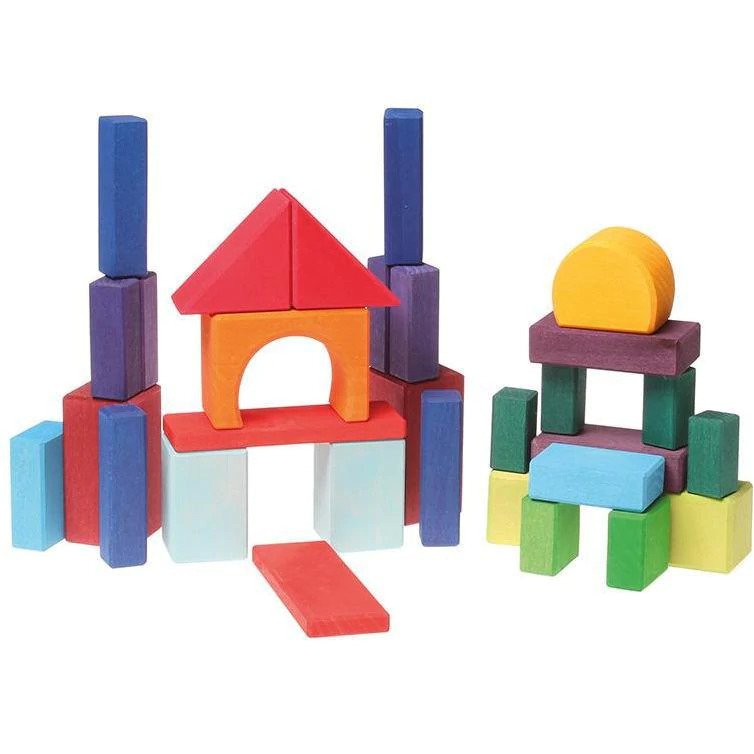Open-ended Play: What is it and Why is it Important?

“Play is the work of childhood.” - Jean Piaget
There is something truly magical about watching a child use their imagination. The make-believe characters and stories they create are all at once impressive and entertaining. As fun as it is to watch our children during these moments, did you realize this form of play is also essential to early childhood development?
You may have even heard of open-ended play. But what exactly is open-ended play and how is it beneficial for your child? Today we’ll take a look at the many benefits of open-ended play for your child’s social, emotional, and intellectual growth.
What is open-ended play?
Open-ended, or unstructured play, is exactly what it sounds like: a play environment without structure. Unlike structured play, such as board games, which includes a specific set of rules or guidelines, open-ended play encourages children to express themselves freely while they play. With a priority on fun and creativity, unstructured play is free of rules or instructions for children to follow. Unlike closed-ended activities, during open-ended play there is no correct or incorrect way to play or complete a project. While they play, children possess the power and ability to make their own choices and decisions to fully engage their imagination and creativity.
Examples of open-ended play materials may include:
- Recycled materials (such as cardboard boxes, toilet paper rolls, etc.)
- Craft materials (pipe cleaners, pom poms, paper, pencils, paints, etc.)
- Kinetic sand
- Clay or playdough
- Ribbon or fabric
- Paper supplies
- Grapat mandala
- Grimm’s wooden building blocks
- Lubulona wooden toys
- Magna-Tiles
- Dolls and stuffed animals (like the fun creations of By Astrup)
- And much more
Early child development
As parents, we do everything in our power to provide our children with opportunities for their best future. The goal is to create well-rounded humans who grow up to become compassionate problem solvers. We want them to be able to make confident divisions and to navigate those decisions in a successful manner.
According to world-renowned Swiss scientist and developmental psychologist Jean Piaget, “Play is the work of childhood.” Piaget’s life’s work involved studying the cognitive development of children. Piaget's theory of cognitive development theorizes intelligence changes as children develop from infancy through adulthood. Additionally, a child's cognitive development is not solely about attaining knowledge, that children have to develop or construct a mental model of the world. The second stage, the preoperational stage, is built on the foundation that children develop their imagination and memory between the ages of three through seven.
Open-ended play builds the leaders of tomorrow
Unstructured play empowers your child to become the leader in their imagination. Essentially, when you don’t provide your children with a set of instructions they begin to make their own decisions. For example, when you offer your child a card game, they’ll follow the rules provided in the game (or your instructions on how to play). However, when you provide them with a set of Magna Tiles or Grimm’s wooden building blocks, they’ll build a creation from their own imagination. Open-ended play empowers children to become the leaders of their play time and develop critical decision making skills. This inturn helps them to make confident decisions as they continue to grow and develop into their adult years.
Experiment with new ideas
There is no wrong or right way to engage in open-ended play. When there are no set rules, children are less conscientious about completing the activity incorrectly. This freedom helps to build your child’s confidence in their own abilities. With open-ended play, your child can experiment with new concepts and new ideas. They can draw what they want, build what they want, and create the characters and stories they want. Unstructured play also allows them to develop confidence in themselves and their own ideas. Children who frequently participate in open-ended play develop an “outside-of-the-box” mentality that can serve them well in life.
Encourage open-ended play with Toy Box
Are you interested in providing your child with some new toys and materials that encourage open ended play? The toy enthusiasts at Toy Box can help! We have a wide range of toys to entertain and educate your children. From Magna Tiles and Grapat mandala to cuddly dolls and fun accessories By Astrup, we have a wide range of fun and exciting toys to jump start your child’s next imaginative open-ended play session!
We encourage you to virtually browse our latest inventory. Need a little help? We’d love to talk to you more about finding the perfect gift for your child. Contact a member of our team to learn more.
